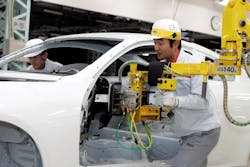As the manufacturing climate in Japan shifts from low-cost mass production centered on high-cost machinery to multi-product variable-quantity production that delivers products as needed, workforce models will change.
One of the keys to realizing this new system will be the development of production personnel who can respond flexibly to diverse tasks. In addition to a flexible workforce, the country is facing a smaller workforce due to falling birthrates and an aging population. To address these factors, measures are needed to utilize personnel in diverse ways and secure necessary human resources at production sites.
On April 11, The National Institute of Advanced Industrial Science and Technology (AIST), Oki Electric Industry Co., Ltd., NS Solutions Corp. and Mitsubishi Electric Corp. announced the establishment of the Consortium for Human-Centric Manufacturing Innovation (HCMI Consortium).
The HCMI Consortium will help to develop and deploy new manufacturing systems based on the concept of innovative human-centric manufacturing. The aim is to realize systems in which people become more flexible in their work. These flexible production systems will allow people to collaborate with machines effectively and facilitate the transfer of expert skills to newer generations of workers. Also, new environmental and management methods will enable employees to leverage their mental and physical abilities for higher quality work.
The consortium established “manufacturing innovation bases” where participating organizations will conduct research, verifications and evaluation. This initially will be carried out at a model factory scheduled to open at the AIST Tokyo Waterfront’s Cyber-physical Systems Research Building. Model bases will be established regionally thereafter. The HCMI Consortium, as the operator of these bases, will support activities aimed at establishing new manufacturing systems as well as raise awareness and support the commercialization of these new methods.
Main Activities
1)Research and develop, verify and evaluate new systems for human-centric manufacturing
2)Manage data from R&D, verifications and evaluations and promote its use in manufacturing
3)Support the introduction of related technologies and personnel in society and for business development
4)Organize groups to research, study and review issues related to human-centric manufacturing
5)Disseminate and share information to raise awareness
About the Author
IW Staff
Find contact information for the IndustryWeek staff: Contact IndustryWeek
